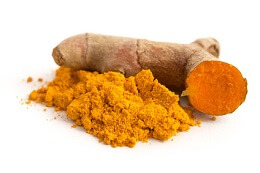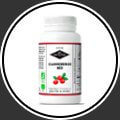Main properties and uses of turmeric
Turmeric, a plant with multiple virtues. Powerful antioxidant thanks to the curcumin it contains, it helps protect against certain diseases linked to premature aging of cells. An effective anti-inflammatory, it is better tolerated in the stomach than traditional anti-inflammatories.
Different forms of using turmeric:
Turmeric can be consumed in different forms:
- In capsules (containing turmeric powder) which is the most practical form.
- Powder: to use in the morning, mixed or not with yogurt or cereals.
- Hydro-alcoholic extract: dilute in a glass of water.

Turmeric ID Card
- Botanical name:
Curcuma longa - Synonyms:
Tigernut, Indian saffron
- Family :
Zingiberaceae - Part used:
The dried rhizome
- Harvest time:
January to March - Geographic origin :
India, Madagascar, Sri Lanka
-
Turmeric as an antioxidant:
Our cells are subject to what we call constant “oxidative stress”. These small oxidizing molecules (also called reactive oxygen species or "ROS") are produced by our body but also come from food, pollution or toxic substances such as tobacco... In normal situations, our cells are able to defend themselves thanks to the antioxidant molecules they produce. Sometimes this mechanism is overwhelmed, there are too many oxidizing molecules and cell death results.

The most interesting synergies based on turmeric
It may be interesting, to potentiate the effects of turmeric, to combine it with other plants, essential oils or natural active ingredients. Here are some ideas depending on the pathology to be treated:-
For sportive people :

Plants: harpagophytum, blackcurrant and meadowsweet and nettle (rich in silica)
Essential oils: in massage: fragrant wintergreen and juniper
Other active ingredients: colloidal silica in liquid, glucosamine and marine collagen
Precautions for use and contraindications of turmeric:
This information is not exhaustive!! Always also consult the instructions on the product packaging as well as the manufacturer's recommendations. If in doubt, consult a health professional.
- Do not use in case of gallstones or chemotherapy.
- Turmeric can thin the blood: stop at least 2 weeks before surgery. Use in people on anticoagulants is not recommended.
- Keep out of reach of young children. Use reserved for adults.
- Not recommended for children, pregnant or breastfeeding women.
- This product cannot replace a varied diet and a healthy lifestyle.
- Do not exceed the recommended daily dose.
Interactions to consider with turmeric:
Attention ! Turmeric can thin the blood and lower circulating sugar levels. You must therefore be careful and notify your doctor if you take other medications or food supplements with the same effects at the same time.
So be careful with: garlic, quercetin, milk thistle, resveratrol, aloe vera, ginger, ginseng, ginkgo, Co-enzyme Q10, flax seeds and omega 3 EPA and DHA, lemon essential oil. All reduce sugar levels and/or thin the blood.

Turmeric and cancer: an update on the issue
Cancer being a serious and increasingly common pathology, it seemed necessary to take stock of the issue regarding the use of Turmeric in this indication.
PLEASE NOTE: This will never replace chemotherapy or radiotherapy or a visit to a specialized oncologist.
It has been suggested that turmeric may, in combination with chemotherapy and radiotherapy, slow the development of certain cancers by accelerating the death of cancer cells and decreasing the risk of metastasis. It would also help reduce skin damage caused by radiotherapy, particularly in the treatment of breast cancer.
However, it is recommended not to consume turmeric on the day of anti-cancer treatment because it would reduce the action of certain chemotherapies. Indeed, certain chemotherapies and radiotherapies have oxidizing properties, useful for killing cancer cells. The antioxidant effect of turmeric would therefore reduce the therapeutic action of these treatments. In addition, turmeric is completely contraindicated with several anti-cancer treatments, including certain treatments against breast cancer. In cases where it is authorized, a dose of 8g per day seems to be a well-tolerated dose but be careful, caution is required and the use of turmeric during anti-cancer treatment must be supervised by a doctor.
For more information on turmeric and cancer, food supplements that can help or interactions between food supplements and anti-cancer treatment: http://www.cancer.be/complementsalimentaires/curcuma
Conclusion and professional opinion:
Due to its multiple benefits, turmeric is a versatile plant, safe to use with few side effects. Its anti-inflammatory properties, well tolerated in the stomach, give it a certain added value compared to classic anti-inflammatories in chronic treatment. However, its “anti-cancer” effects, suggested by numerous studies, must be taken with a grain of salt and taking turmeric in combination with chemotherapy must be supervised by a doctor.
The data summarized here is given for information purposes and cannot engage our responsibility.
For further information on use, instructions for use, precautions to take and uses advised against, please refer to the commercial data sheet and label of your products. The food supplements described here are natural plant-based products. However, they are not without danger and without possible interactions with other medications or treatments. It is therefore very important to respect the recommended doses and to tell your doctor or pharmacist that you are taking these products: only he or she will be able to determine if any interactions exist between the food supplement and another treatment or medication that you may be taking.
The pathologies cited in this article are illnesses that can be serious or even life-threatening. A visit to a doctor remains essential. Only he will be able to make a precise diagnosis and, if necessary, provide you with the most appropriate treatment.
Bibliography
- Pierre M, Gayet C My bible of herbalist secrets. Ed. Leduc. S 2016
- Pierre M the bible of healing plants. Ed. Du Chêne 2017
- Festy D My illustrated primer on essential oils. Ed. Leduc.s 2015
- Witkin JM and Li X Curcumin, an active constituent of the ancient medicinal plant Curcuma longa L.: some uses and the establishment and biological basis of medicinal efficacy. Drug Targets for CNS Neurological Disorders. 2013;12(4):487-97
- American Institute for Cancer Research. Dietary Options for Cancer Survivors. 2002.
- Vandebroek A. Food supplements. Conference on unconventional cancer treatments, Fondation contre le Cancer, 2011.
- Belcaro G. et al. A controlled study of a lecithinized curcumin delivery system (Meriva®) to mitigate adverse effects of cancer treatment. Phytother Res. 2014 Mar;28(3):444-50. Epub 2013 Jun 15. PubMed PMID: 23775598
- Jagetia GC. Radioprotection and radiosensitization by curcumin. Adv Exp Med Biol. 2007;595:301-20. Review. PubMed PMID: 17569217.
- Bordoloi D. et al. Multi-targeted agents in chemosensitization of cancer cells: what we have learned so far from curcumin. Recent Anticancer Drug Discovery Pat. 2016;11(1):67-97.
- Ryan JL et al. Curcumin for radiation dermatitis: a randomized, double-blind, placebo-controlled clinical trial in thirty patients with breast cancer. Radiator. Res. 2013;180:34-43
- http://www.cancer.be/ complementsalimentaires/curcuma
NOTE: This article was written by a pharmacist. The data summarized there come from the scientific literature and the references cited above. For medical advice, in the event of specific or prolonged symptoms, please consult your doctor. Only he will be able to make a precise diagnosis and, if necessary, provide you with the most appropriate treatment.
 OUR
OUR